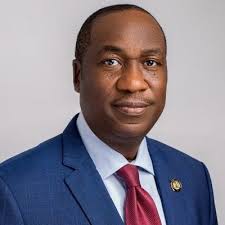Roots of Our Environmental Challenges Traced To Colonial Masters – Lagos Deputy Governor
 The Deputy Governor, Lagos State, Dr. Obafemi Hamzat, has traced the roots of Nigerian environmental challenges to colonial masters.
The Deputy Governor, Lagos State, Dr. Obafemi Hamzat, has traced the roots of Nigerian environmental challenges to colonial masters.
Hamzat who was the special guest of honour, at the 68th annual conference of the Historical Society of Nigeria, HSN, and represented by the Permanent Secretary, Lagos State Ministry of Tourism, Culture, and Art, Mrs. Oloruntoyin Atekoja, on Monday, explained that post-colonial industrialisation and globalisation combined to expand issues of the environment.
In his words:” The history of Nigeria is strongly intertwined with the environment. We must understand the history of the environment to enable us to make informed decisions in today’s present challenges of the ecosystem.
“It is also important to note that the environmental condition during the pre-colonial era laid the foundation for many of the challenges that post-colonial Nigeria continues to face. These included: deforestation, soil erosion, pollution, and the degradation of the ecosystem which are ongoing issues that require sustained combined efforts to address.
“The colonial era was characterized by the exploitation of natural resources for their benefit. The environmental consequences were often overlooked or disregarded in favour of economic gains.
“After independence, the country experienced rapid industrialisation and globalisation, and these all exercebarted environmental issues.
“Although there have been efforts by governments and NGOs to restore the ecosystem, there is a need for a multi-faceted approach in solving them which includes: government intervention, community, participation and international corporation.
“Again, despite legislations to address environmental issues, no due emphasis has been placed on information.
Mere legislation is not enough until the consciousness of the environment is embedded in the lives of the citizens via adequate information channels and public enlightenment advocacy.” Dr. Hamzat noted.
Earlier on, the President of HSN, Prof. Samuel Aghalino, in his opening remarks, noted that the theme of this year’s conference: “The Nigerian environment since the pre-colonial period,” was chosen to brainstorm on positive solutions to the nation’s challenges, and also advocate ways to reinvent the country’s position globally.
Aghalino explained: “The theme of the 68th conference: The Nigerian Environment Since the Pre-colonial Period was picked to further throw up more complex polemics which we hope will help us further the efforts toward reinventing our nation for enhanced placement in the international community.
“As Aa Society, we are not unaware of the plethora of challenges faced by our over six decades old nation. For us as an academic body, we have chosen to saddle ourselves with the key responsibility of preferring viable solutions to our nation’s hydra-headed challenges. It is trite to observe here that all functioning nations are Knowledge-Driven. This explains our resolve to interrogate emerging but challenging issues woven around the Nigerian environment.
“It is a settled issue that Nigeria is blessed with human and material resources. Indeed, our environment is nature endowed, and the exploitation of natural resources has created environmental externalities. Thus, the challenges arising therefore require our scholarly attention and interrogation. This is the reason why historians, environmentalists, and other intellectuals have converged in Lagos, the commercial nerve centre of Nigeria.”
For the presentation of the Kenneth Dike Memorial Lecture, the guest lecturer, and a Professor of History and Economics at, the University of Port Harcourt, Prof. Ben Naanen, reiterated that there has to be clear decisive action by the government to address the issues of environment, especially as it relates to flooding, pollution of the ecosystem in Niger Delta, majorly, and other parts of the country.
“The government has to take decisive actions on environmental issues. Right now the issues are environmental protection and environmental education. The awareness level is very minimal in this country. We have to create environmental awareness where people will take into their own hands the issue of the environment, and contribute to salvaging the planet. Look for example, the whole question of blocking the drains is part of what is responsible for flooding in Lagos state and major cities.”
On the solutions to the environmental challenges facing Niger Delta, Naanen noted that: “The Nigerian government and oil companies operating in the Niger Delta have to set up a major environmental programme to clean up the region.
“Environmental degradation has destroyed lives, and livelihoods and impacted the health of the people there. So, I am suggesting that measures should be put in place to address oil theft in the region.”
